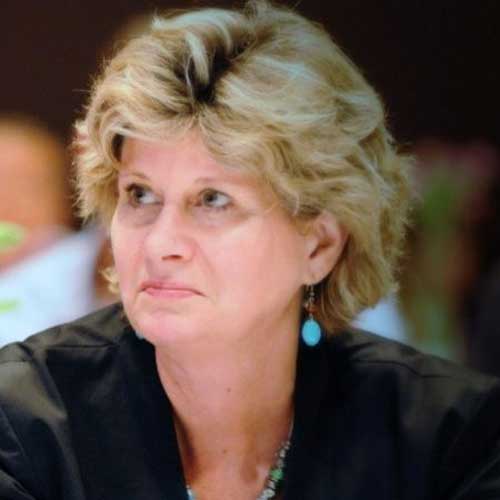Day One: Thursday, September 28, 2023
10:00 EDT
10 minWelcome and Opening Remarks from the Chair
10:10 EDT
20 minEM in the Canadian Context - Toward a Resilient 2030!
Deryck Trehearne, Director General, Government Operations Centre, Public Safety Canada
10:30 EDT
45 minGlobal Change and Catastrophic Loss in Canada
Glenn McGillivray, Managing Director, Institute for Catastrophic Loss Reduction
Glenn will speak about the increasing challenges faced by various stakeholders – most particularly property owners, businesses, governments and insurers – in managing risks associated with severe weather and seismic events. Topics will include:
- How severe weather losses are rising across Canada
- What can be expected through the next decade in terms of disaster loss claims and prevention.
- ICLR’s work and its efforts to help insurers and others mitigate the impact of severe weather and earthquake events
11:15 EDT
minConference Chair
11:15 EDT
60 minClimate Change and Adaptation Strategy - From Knowledge to Action!
Jeff MacDonald, Director General, Climate Change Adaptation, Environment and Climate Change Canada
Phil Moore, Vice President, Emergency Response & Business Continuity, Telus Communications
- Government of Adaptation Action Plan and Strategy
- Reactive and anticipatory adaptation
- Using science to take action before the worst impacts of change are incurred
- Need for: Resilient infrastructure, healthier communities, enhanced biodiversity and nature conservation, a more resilient economy and workers
- Need to move from static framing of climate risks to a more dynamic framing that considers cascading interactions, feedbacks and side-effects
- Including extreme events and ‘unknown unknowns’ as part of effective infrastructure design and management, organizational resilience and continuity systems and processes
- Examples of communities and sectors adapting to a changing climate across Canada
- Steps Canadians are taking to understand how climate change affects them and the solutions they find to adapt and increase their resilience.
- Assessing the costs and benefits of climate change adaptation
12:15 EDT
60 minBreak
13:15 EDT
45 minIndigenous Science – Learning from the Indigenous Community
Myrle Ballard, Director, Indigenous Science Division (ISD), Environment and Climate Change Canada
- Fostering awareness of Indigenous Science
- Understanding Indigenous Science as a distinct, time-tested and methodological knowledge system that will enhance and complement Western science
- Bridging bringing Indigenous Science awareness to the Western science inside the department.
- Braiding people on the land will be first to identify a change in how the water or wildlife look.
- Weaving Using Indigenous Science as a tool in the department’s approach to environmental issues and species management
14:00 EDT
45 minBusiness Continuity Management: Upgrade Your Plan with a Focus on Climate Change
Business Continuity Management integrates the disciplines of Emergency Response, Crisis Management, Information Technology Disaster Recovery and Business Continuity (organizational/operational relocation). Risks, the impacts of business interruption and their frequency have changed dramatically as a result of climate change but many organizations have not been quick to update their plans accordingly, lulled into a sense of complacency after the pandemic forced hybrid work environment. Is your BCM programme upgraded and fine-tuned to deal with Climate Change and surprising outcomes? Topics covered will include:.
- Risk assessments that should be on your radar screen
- Impacts to your Business Impact Analysis and prioritization
- Real life case studies and lessons learned
- Impacts to existing continuity strategies and the need for elasticity
- Ideas for viable exercises and tests to ensure plan sustainability
14:45 EDT
15 minBreak
15:00 EDT
45 minImpact of Climate Change on Your Supply Chain: Become Future Resilient
Present view of climate change impact on supply chains
- How it has exposed the fragility with the global movement of goods
- Handling a complex supply chain with rudimentary tools
Future view: expected climate change impact; roadblocks & how to manage them
- Increase severe weather events and managing supply route disruptions
- Population migration on supply workforce & customers
- Animal/insect migration and impact on natural harvest supplies (evasive species)
- Permafrost deterioration and arable (farmable) land for product supplies
- Infrastructure changes needed to support changing landscape
- Changing supply routes & their impact on the movement of goods (Arctic)
Planning to secure your supply chain for the future
- On-shore vs. Near-Shore vs. Off-Shore suppliers
- Developing the best risk management team and end-to-end understanding of your supply/value chain through digital mapping
- Managing the balance in your supply chain between risk and cost
15:45 EDT
End of Day One
Day Two: Friday, September 29, 2023
10:00 EDT
15 minWelcome and Opening Remarks from the Chair
10:15 EDT
45 minBCM and Enhanced Resilience: The Canadian Context
Jeff MacDonald, Director General, Climate Change Adaptation, Environment and Climate Change Canada
Adapting to climate change is not only something government should do, it is something government must do, moving faster and going further than ever before. This session will cover relevant international agreements and federal government policy for a full understanding of BCM and enhanced resilience relating to climate change in the Canadian context:
- International agreements
- Continued collaboration, engagement, and the use of science and evidence-based decision-making.
- Whole-of-government/society approach
- The Canadian Emergency Management Strategy
- Components of EM: prevention/mitigation, preparedness, response and recovery.
- The vulnerability of Indigenous Communities
- The concept of Resilience
- Federal Provincial and Territorial Action Plan and EM Strategy
- Priority areas of activity
- The Strengthened Climate Plan, adopting additional measures to achieve net zero emissions by 2050
- Accelerating the important work of adapting, responding, mitigating and building resilience
11:00 EDT
45 minManaging Extreme Weather Events on the Hydro One System
Ted Lyberogiannis, Director, Integration and Emergency Management, Hydro One
- Overview of the Hydro One’s Electricity System and its importance to Ontario
- Recent examples of extreme weather events on our system
- How Hydro One prepares for emergencies
- Investments that we are making to increase the resiliency of our grid
11:45 EDT
45 minHow Financial Institutions Are Approaching Climate Risks
Craig Stewart, Vice President, Federal Affairs, Insurance Bureau of Canada
- Is Canada remaining insurable?
- How are home and business insurers adjusting to escalating climate risks
- How are OSFI and provincial regulators responding to climate risk
- Implications for the real estate industry and banks
- What does the future hold for the financial sector and what changes can we expect?
12:30 EDT
60 minBreak
13:30 EDT
60 minBuilding Climate Change Resilient Communities through BCP and Emergency Planning
Alain Bourque, Executive Director, Ouranos (Montréal, QC)
Scott Vaughan, Senior Fellow, International Institute for Sustainable Development (IISD)
Community resilience is an attribute of the community as a complex integrated system, describing the ability of its members to draw upon their own inherent strengths and capabilities to absorb the impact of a disruption, to reorganize, change, and learn from the disruption, and to adapt to emergent shocks. Learn:
- How to increase community resilience
- Need to acknowledge different needs, resources, capacities, and vulnerabilities of individuals, groups, and communities
- Consideration of factors such as gender, socio-economic conditions, local community conditions and traditional Indigenous knowledge.
14:30 EDT
45 minClimate Data for Decision Makers: Finding, Analyzing, and Making Sense of Future Climate Projections
- Where to find authoritative climate data
- Tools and resources to help make sense of these data
- Acknowledging uncertainties in future climate projections
- Climate data in action: example case studies from the City of Ottawa and Parks Canada
15:15 EDT
15 minBreak
15:30 EDT
45 minAiming High - Planning for Resilience and Recovery and Celebrating Local Leadership in Canada (receive an authoritative 5-book series on Resilience and Recovery Across Canada)
- What we do well
- Importance of recovery in determining the future
- Dealing with national, provincial and municipal jurisdictions
- Recovery toolboxes: sustainable tools and processes
- Elected officials as change agents
16:15 EDT
End of Day Two












